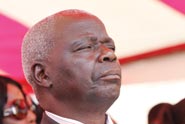
ENERGY and Power Development minister Dzikamai Mavhaire has defended government’s mandatory ethanol blending policy, saying the move had maintained petrol price levels at less than $1,50 per litre instead of $1,60 that motorists could have been forking out for every litre of unleaded petrol.
EVERSON MUSHAVA
In an interview with NewsDay yesterday, Mavhaire said the country was realising $9 million monthly savings on fuel imports and the figure could rise to $20 million a month with increased ethanol production.
“Instead of criticising the Green Fuels project, people should think of the economic gains brought about by ethanol blending,” Mavhaire said.
“Apart from employing over 4 000 workers, the Green Fuels project has also helped the country save over $9 million every month in terms of fuel imports. People should also consider the 12 megawatts of electricity generated by the project.”
Ethanol blending has received a barrage of criticism, with most people claiming it has had adverse effects on their vehicles. Mavhaire, together with the Zimbabwe Energy Regulatory Authority, have been dragged to court by some motorists who felt that the mandatory blending was a violation of their right to choose.
The blending ratio started at 5% ethanol and 95% unleaded petrol on August 15 last year, following the awarding of a monopolistic ethanol production (mandatory blending) licence to Green Fuels on August 5. The blending ratio later increased to 10% and then 15% on November 30. Government had initially planned to introduce E20 by end of this month, but was forced to revert to the 10% ratio following a public outcry.
But Mavhaire said the government was forced to go back to the 10% blending ratio because the country was not producing enough ethanol at the moment.
- Chamisa under fire over US$120K donation
- Mavhunga puts DeMbare into Chibuku quarterfinals
- Pension funds bet on Cabora Bassa oilfields
- Councils defy govt fire tender directive
Keep Reading
“We are inviting people to grow sugar and move the country to clean energy and move away from fossil fuels,” Mavhaire said.
He said government was planning to put a booster to increase pumping of fuel through the Feruka Pipeline from the current 4 million to 180 million litres a day.
“We will be able to export fuel to neighbouring countries like South Africa and Zambia. We are centrally placed to be an exporter,” Mavhaire said.











